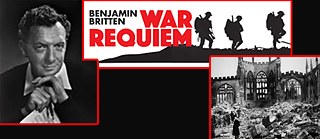in cooperation with BERLIN PHILHARMONIC ORCHESTRA
Britten’s WAR REQUIEM with the National Youth Orchestra of Germany

DIGITAL CONCERT HALL
Benjamin Britten
War Requiem
for Soloists, large Choir, Children’s Choir,
large Orchestra and Chamber Orchestra
Banu Böke soprano, James Gilchrist tenor, Erik Sohn baritone, Orchestre Français des Jeunes, Chor des Bach-Vereins Köln e.V., Polski Narodowy Chór Młodzieżowy, Agnieszka Franków-Żelazny chorus master, Coventry Cathedral Girls’ Choir, Kerry Beaumont chorus master, Les Pastoureaux, Philippe Favette chorus master, Jugendchor der Lukaskirche Bonn, Thomas Neuhoff chorus master, Daniel Spaw
Goethe-Institut invites the Berlin Philharmonic Orchestra to its auditorium in a digital format with high definition video live-streaming for the connoisseurs of Western classical music of Chennai. The Digital Concert Hall with excellent sound and video is the best close-to-real experience one can get.
On a special invitation of the Berliner Philharmoniker Foundation, the National Youth Orchestra of Germany chose to perform Benjamin Britten’s 1966 War Requiem, a singular work of 20th century musical history written for three vocalists, a boys choir, a mixed chorus, a chamber orchestra and a symphony orchestra, it is nothing less than a highly complex and immediately poignant musical contribution to the European idea of international understanding, and who better to represent this than an orchestra of young musicians supported by an internationally acclaimed trio of vocalists?
The War Requiem, composed in 1961, is one of Benjamin Britten’s highly personal anti-war statement, due to the circumstances alone; moreover, it is his only composition with a clearly recognizable political connotation and a sociopolitical as well as moral and religious intent. Its origins date back to the Second World War. During the night of 14 November 1940 a ten-hour bombing raid by the German Luftwaffe destroyed the entire city of Coventry in central England. After the war ended, work to rebuild the church began immediately and was consecrated on 25 May 1962; five days later, Britten’s War Requiem was performed there for the first time.
The ethical rationalist spirit of the War Requiem is obvious from the choice of texts depicting ultimately a deliberate aestheticization of battle as such. This opus magnum draws its tremendous fascination, nervous tension and suggestive power from musical and structural contradictions. The morally subjective sections were assigned to the tenor and baritone soloists reflecting the horror of war, accompanied by the chamber orchestra as voices of the fallen soldiers. The soprano soloist, chorus and the immense yet transparent orchestra stand for the mourning of humanity while the young voices and the organ represent the remote mystical world far above the battlefields.
It is not surprising that such a bipolar and colossal work has an enormous emotional impact that not only moves the listeners in the Aristotelian sense but on the basis of its dialectical construction also produces quite diverse reactions perhaps intentionally (like the pity of war and the joys of life).
Details
Goethe-Institut / Max Mueller Bhavan Auditorium
No.4 5th Street, Rutland Gate
Nungambakkam
600 006 Chennai
Price: All are Welcome
091 44 2833 1314 che-info@goethe.de